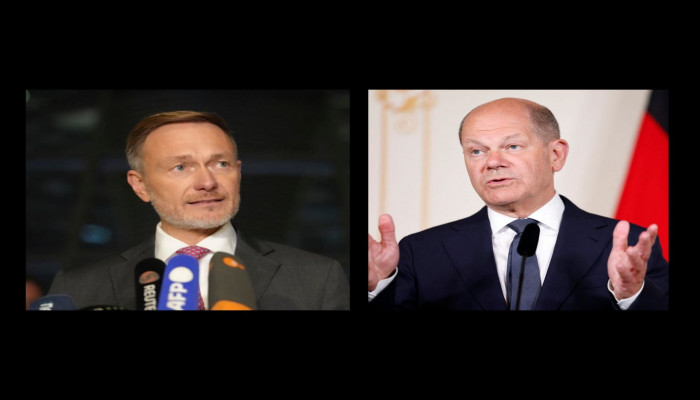Germany in political crisis after Chancellor Scholz dismisses finance minister
- In Reports
- 04:29 PM, Nov 07, 2024
- Myind Staff
Germany's ruling coalition collapsed on Wednesday when Chancellor Olaf Scholz dismissed his finance minister, Christian Lindner, of the Free Democrats (FDP) party, setting the stage for a snap election. The political turmoil in Europe's largest economy unfolded just hours after Donald Trump was declared the winner of the U.S. presidential election. With Lindner's removal, Scholz is anticipated to lead a minority government, supported solely by his Social Democrats and the Greens, the second-largest party.
Scholz will need to depend on ad-hoc parliamentary majorities to push through legislation and plans to hold a confidence vote on his government in Parliament on January 15, which could pave the way for snap elections by the end of March. He also stated that he would seek support from Friedrich Merz, leader of the opposition conservatives, who currently leads in the polls, to secure backing for the budget and increased military spending. Merz is expected to address the matter in a news conference on Thursday morning.
The collapse of Scholz's three-party coalition marks the end of months of disputes over budget policies and Germany's economic trajectory. During this period, the government's popularity has declined, while far-right and far-left movements have gained significant momentum. "We need a government that is able to act, that has the strength to make the necessary decisions for our country," Scholz told reporters.
Scholz explained that he dismissed Lindner due to his obstructive behaviour on budget matters, accusing the finance minister of prioritising his party over the country's interests and blocking key legislation on unfounded grounds. This decision came just a day after the election of Republican Donald Trump as the U.S. President, with Europe now racing to formulate a unified response on issues ranging from potential new U.S. tariffs to Russia's war in Ukraine and the future of the NATO alliance.
The political crisis hits Germany at a crucial moment, as the country grapples with a stagnant economy, aging infrastructure, and an ill-prepared military. This shake-up could amplify growing discontent with Germany's mainstream parties, potentially benefiting younger populist movements, including the anti-immigrant Alternative for Germany (AfD). Meanwhile, with France also facing political instability following snap elections earlier this year, turmoil in the EU's two largest economies may hinder efforts to strengthen the bloc's integration, especially as it faces challenges from both the east and west.
The coalition has been divided over the best approach to revive Europe's largest economy, which is experiencing its second consecutive year of contraction and struggling with a crisis in its economic model. This comes after the end of cheap Russian gas following its 2022 invasion of Ukraine, coupled with growing competition from China. Scholz proposed capping energy costs for companies to enhance Germany's attractiveness as a business hub. He also advocated for a package to protect jobs in the struggling auto industry and for increased support for Ukraine.
The FDP had argued that public spending cuts, tax reductions, and less regulation were the solutions to Germany's economic struggles. It also advocated for slowing the country’s transition to a carbon-neutral economy. After Scholz’s remarks, Lindner claimed that the chancellor had attempted to pressure him into violating the constitutionally mandated debt brake, a spending limit that Lindner, a fiscal conservative, refused to support. Government sources revealed that Scholz had proposed increasing the Ukraine support package by 3 billion euros ($3.22 billion) to a total of 15 billion euros, planning to fund it by suspending the debt brake.
"Olaf Scholz refuses to recognise that our country needs a new economic model," Lindner told reporters. "Olaf Scholz has showed he doesn't have the strength to give his country a new boost."
While the SPD and the Greens disagree on certain issues, they both agree on the need for targeted government spending. The three remaining FDP ministers—responsible for transport, justice, and education—each chose to leave the government voluntarily. Scholz criticised Lindner for prioritising the short-term survival of his party, stating, "Especially today, one day after such a significant event as the U.S. elections, this kind of selfishness is completely incomprehensible." Economy Minister Robert Habeck of the Greens explained that the coalition had failed to reach an agreement on how to address a funding gap in next year's budget.
"I want to say on our behalf that tonight feels wrong and doesn’t feel right. It’s almost tragic on a day like today, when Germany needs to show unity and capacity for action in Europe."







Comments